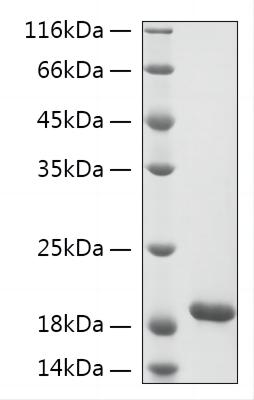Description
Recombinant Human PCLAF Protein
The Recombinant Human PCLAF Protein is a biologically active recombinant protein that plays a significant role in various cellular processes and signaling pathways in human biology. This protein is widely employed in immunological research, cell biology studies, protein-protein interaction analyses, and therapeutic development, providing researchers with a reliable tool for investigating PCLAF function and its implications in health and disease.
This product (SKU: RPCB2196) is produced using E. coli and features a N-His tag for convenient detection and purification. The protein exhibits a calculated molecular weight of 13.8 KDa. with an observed molecular weight of 19 KDa under denaturing conditions, achieving ≥ 95 % as determined by SDS-PAGE., ensuring exceptional quality and consistency for research applications.
Key Features
| High Purity by Affinity Chromatography | |
| Mammalian & Bacterial Expression Systems | |
| High lot-to-lot consistency via strict QC |
| Product Name: | Recombinant Human PCLAF Protein |
| SKU: | RPCB2196 |
| Size: | 50 μg |
| Reactivity: | Human |
| Synonyms: | PCLAF, KIAA0101, NS5ATP9, PAF |
| Tag: | N-His |
| Expression Host: | E. coli |
| Calculated MW: | 13.8 KDa. |
| Observed MW: | 19 KDa |
| Gene ID: | 9768 |
| Protein Description: | High quality, high purity and low endotoxin recombinant Recombinant Human PCLAF Protein (RPCB2196), tested reactivity in E. coli and has been validated in SDS-PAGE.100% guaranteed. |
| Endotoxin: | Please contact us for more information. |
| Purity: | ≥ 95 % as determined by SDS-PAGE. |
| Formulation: | Lyophilized from a 0.22 μm filtered solution of PBS, pH 7.4. Contact us for customized product form or formulation. |
| Reconstitution: | Centrifuge the vial before opening. Reconstitute to a concentration of 0.1-0.5 mg/mL in sterile distilled water. Avoid vortex or vigorously pipetting the protein. For long term storage, it is recommended to add a carrier protein or stablizer (e.g. 0.1% BSA, 5% HSA, 10% FBS or 5% Trehalose), and aliquot the reconstituted protein solution to minimize free-thaw cycles. |
| Storage: | Store at -20℃.Store the lyophilized protein at -20℃ to -80 ℃ up to 1 year from the date of receipt. After reconstitution, the protein solution is stable at -20℃ for 3 months, at 2-8℃ for up to 1 week. |
KIAA11, also known as p15(PAF), is a proliferating cell nuclear antigen-associated factor that interacts with proliferating cell nuclear antigen(PCNA). It was initially isolated in a yeast two-hybrid screen for PCNA binding partners and was shown to bind PCNA competitively with the cell cycle regulator p21(WAF). KIAA11 is localized primarily in the nucleus. It shares the conserved PCNA binding motif with several other PCNA binding proteins including CDK inhibitor p21. KIAA11 is involved in cell proliferation and plays a role in early tumor recurrence (ETR), and prognosis of hepatocellular carcinoma (HCC). KIAA11 is expressed predominantly in the liver, pancreas, and placenta. It cannot be detected in the heart or brain. It is highly expressed in some tumors, especially esophageal tumors, in anaplastic thyroid carcinomas, and non-small-cell lung cancer lines. Overexpression of KIAA11 predicts high stage, early tumor recurrence, and poor prognosis of hepatocellular carcinoma. It also may be involved in the protection of cells from UV-induced cell death.


